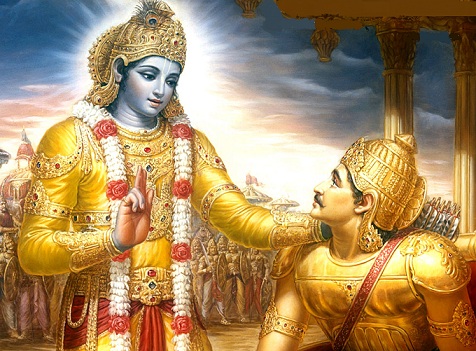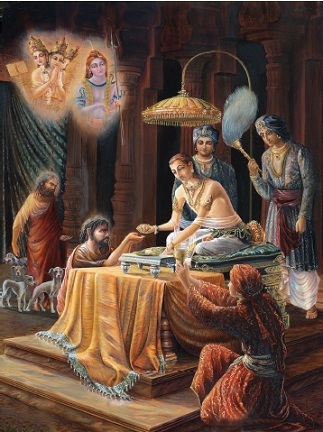
Lord Krishna enters the battlefield of Kurukshetra overtly as the charioteer of Arjuna but covertly as the apostle of compassion.
Compassion can be defined as a passion to obviate or alleviate others’ distress, and someone unable to bear another’s distress is called compassionate. Numerous compassionate persons in the Vedic scriptures have created an indelible impression on the human mind. Among them, the kings named Sibi and Rantideva are especially noteworthy.
King Sibi and the Hawk
The Srimad-Bhagavatam, the Ramayana, and the Mahabharata all relate the story of King Sibi, the ruler of a South Indian kingdom known for his philanthropy. One day, Indra and Agni came to test the limits of the king’s generosity, disguising themselves as a hawk and a dove. The hawk chased the dove, which landed on King Sibi’s lap, trembling with fear. The hawk demanded the king surrender the dove, its prey. But the king refused, saying that the dove had sought his shelter and he would not betray the rules of sanctuary. After a great deal of argument, the hawk agreed to leave the dove alone if, to feed the hawk, the king would carve a chunk of his own flesh equal to the dove’s weight. After endlessly slicing his flesh and placing it on the scale, however, he could not equal the dove’s weight. He then threw his entire body onto the scale, but even then the scale tipped in favor of the dove. At this point the hawk and the dove revealed their true identities and blessed the king for his compassionate traits.
Rantideva Passes the Test
Srimad-Bhagavatam tells us the story of another Vedic king, Rantideva, who had no material ambitions and hence did not enjoy the opulence of his position. He did not struggle to accumulate wealth but accepted whatever came his way by the mercy of providence. When guests appeared before him, he would offer them whatever he had on his dining menu. On account of this charitable impulse, he and his family would often undergo inadvertent fasting.
Rantideva perceived the presence of God in the heart of every living being and believed that every living being deserved to be treated with due respect and compassion. Because of this perception, he did not discriminate in his treatment of brahmanas, lower-caste sudras, or candalas (dog-eaters or outcastes). He even considered humans and animals to be on the same platform.
One time, after fasting for fortyeight days, the king settled down to consume a sumptuous meal with his family. A brahmana guest arrived, and the king felt honored to receive the exalted guest and gave him a share of the food. The brahmana ate and left.
The king divided the remaining food among his family members; but when he was just about to begin eating, a sudra guest arrived, and the king gave him a share of the food.
A candala guest accompanied by dogs then arrived. He told the king that he and his dogs were hungry and wanted something to eat. The king offered the remaining food to the dogs and their master with respect and also offered his obeisances to them.
All that was left of the meal was enough water to quench the king’s thirst. But just as the king moved to drink, a poor, fatigued, and thirsty candala arrived and begged some water. Due to his soberness and generosity, the king, now on the verge of death from fasting and lack of water, did not hesitate to offer the remnant water to the candala.
As it turned out, Lord Visnu, Lord Brahma, and Lord Siva had come in disguise to deprive the king of his meals and thus show the world the depth of his compassion.
Compassion is one of the sixtyfour superexcellent qualities of Krishna listed by Srila Rupa Gosvami in Bhakti-rasamrta-sindhu. Living entities, being infinitesimal parts of Krishna , receive the gift of compassion as a legacy of Krishna . In the conditional souls this gift remains in a dormant state on account of their association with the illusory energy of the Lord (maya), whereas liberated souls like King Sibi and King Rantideva not only distinctly exhibited the gift of compassion in their day-to-day life, but also passed the tests of the controllers of the universe.
Two Descents by Compassionate Krishna
Krishna is a reservoir of compassion. Some five thousand years ago, during His earthly sojourn of 125 years, He enacted pastimes copiously adorned with compassion. Episodes that highlight Lord Krishna’s compassionate trait include His swallowing a fierce forest fire to save the cowherd boys, and His lifting Govardhan Hill on the little finger of His left hand for seven days to serve as an umbrella to protect the residents of Vrindavan from the onslaught of rain and hail.
In the Mahabharata Lord Krishna entered the battlefield of Kurukshetra overtly as the charioteer of Arjuna but covertly as an apostle of compassion. With His compassionate glance, He liberated from material bondage every living entity that died during the battle. He also cast His compassionate glance on grandsire Bhismadeva, who, sixty days after falling in the battle, breathed his last in the presence of Lord Krishna , the Personality of Godhead. And earlier, when Arjuna got confused after scanning his foes on the battlefield, the compassionate Krishna , in his ostensible mission of enlightening Arjuna, delivered the immortal Bhagavadgita for the ultimate good of humanity.
Reeling under the surge of intense compassion, in 1486 CE Krishna appeared in the guise of His devotee, as Caitanya Mahaprabhu, and stayed on earth for forty-eight years to teach and exemplify His own worship. Lord Krishna had revealed in the Bhagavad-gita that He is veda-vit, the knower of the Vedas, also called sruti. Caitanya Mahaprabhu picked up and broadcast the sruti mantra Hare Krishna , Hare Krishna , Krishna Krishna , Hare Hare/ Hare Rama, Hare Rama, Rama Rama, Hare Hare, enshrined in the Kali-santarana Upanisad of the Krishna -yajur-veda. Pointing it out as the maha-mantra – the great chant for deliverance – Lord Caitanya dedicated it to the baneful souls of Kali-yuga, the present spiritually degraded age.
Chanting the sixteen words of the maha-mantra is the most potent instrument for deliverance in this age. As an indication of the compassionate nature of the maha-mantra, the word Hare found therein is the vocative form of Hara, a name for Srimati Radharani. The supreme internal potency of Lord Krishna , She also represents His compassionate nature.

Risking his life, King Rantideva exhibited the pinnacle of compassion by offering all his food and water to uninvited guests.
In Chapter 22 of The Nectar of Devotion, Srila Prabhupada offers a befitting tribute to Lord Krishna ’s compassion under the subhead “32. Compassionate,” which concludes: “Because Krishna is the Supreme Personality of Godhead, it is very difficult to approach Him. But the devotees, taking advantage of His compassionate nature, which is represented by Radharani, always pray to Radharani for Krishna ’s compassion.”
All this and a lot more make Krishna a byword for ultimate compassion.
Our Potential For Compassion
Krishna is a paragon of compassion, and the living entities, being part of Krishna , are potentially compassionate. However degraded a person may be externally, internally he bustles with potential compassion. For example, I have often observed that after a road accident, a dreadful or sinful person will run to rescue the injured. We need to revive our latent, ingrained compassionate impulse by practicing it in our daily life.
Like love, the emotion of compassion is contagious. We may remember the saying “Love begets love” but forget that “Compassion begets compassion” – a truth we should wake up to every morning and clutch to our heart every night.
Rasa Purusa Dasa, a disciple of His Holiness Gopala Krishna Goswami, passed away while this article was being prepared for publication. He was a chartered civil engineer retired from the government of Haryana and living in Mumbai. We offer our condolences to his family and friends.
